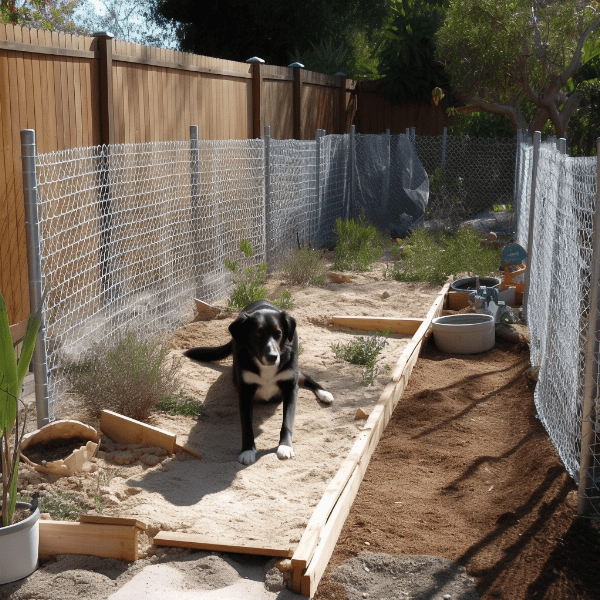Table of Contents
- Understanding Why Dogs Dig
- Providing Adequate Exercise and Stimulation
- Creating a Designated Digging Area
- Using Positive Reinforcement Training Techniques
- Blocking Off Access to Digging Areas
- Using Deterrents to Discourage Digging
- Providing Appropriate Chew Toys
- Addressing Separation Anxiety and Boredom
- Seeking Professional Assistance
- Consistency and Patience: Keys to Success
Understanding Why Dogs Dig
Understanding why dogs dig is the first step in preventing this behavior. While it can be frustrating to find your yard filled with holes, it’s important to remember that digging is a natural instinct for dogs. Here are some common reasons why dogs dig:
Instinctual Behavior
Dogs are descendants of wolves and have inherited many of their instincts, including the instinct to dig. In the wild, wolves dig dens to provide shelter and a safe place to raise their young. Domestic dogs may dig holes for the same reasons, even if they have a comfortable home to live in.
Boredom and Excess Energy
Dogs that are bored or have excess energy may turn to digging as a form of entertainment. If your dog isn’t getting enough exercise or mental stimulation, they may start digging to alleviate their boredom or burn off some energy.
Comfort and Temperature Regulation
On hot days, dogs may dig holes to create a cool place to lay in. In contrast, on colder days, dogs may dig to create a warm spot to snuggle up in.
Anxiety and Stress
Dogs that suffer from anxiety or stress may turn to digging as a coping mechanism. Separation anxiety, in particular, can cause dogs to dig holes in an attempt to escape or find their owners.
Understanding the reasons behind your dog’s digging behavior can help you develop a plan to prevent it. By addressing the root cause of the behavior, you can help your dog break the habit and create a happier, healthier living environment for both of you.
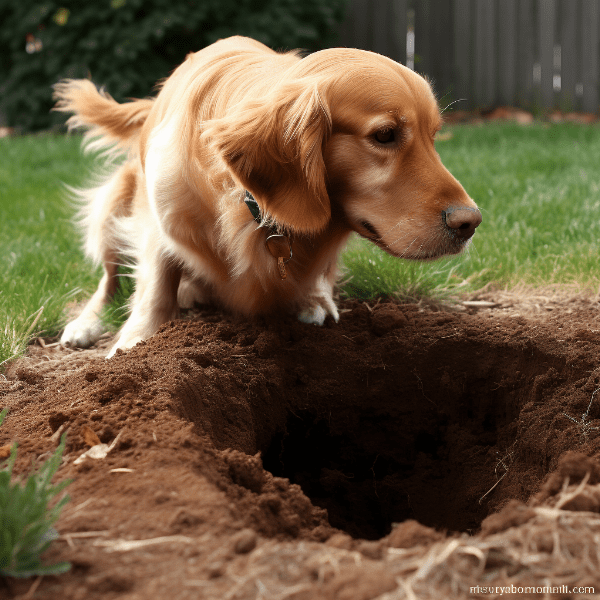
Providing Adequate Exercise and Stimulation
One effective way to prevent your dog from digging is to ensure that they are getting enough exercise and mental stimulation. Dogs that are well-exercised and mentally stimulated are less likely to engage in destructive behaviors such as digging. Here are some tips for providing adequate exercise and stimulation for your dog:
Daily Walks and Playtime
Regular walks and playtime are essential for your dog’s physical and mental well-being. Aim to provide your dog with at least one walk per day and plenty of opportunities to play and run. This will help burn off excess energy and reduce boredom.
Puzzle Toys and Interactive Games
Puzzle toys and interactive games are a great way to provide mental stimulation for your dog. These toys and games challenge your dog’s problem-solving skills and can help prevent boredom and destructive behaviors such as digging.
Obedience Training and Agility Exercises
Obedience training and agility exercises are not only a great way to provide mental stimulation for your dog, but they also help improve their overall behavior and obedience. Consider enrolling your dog in obedience classes or agility training to provide them with the mental and physical stimulation they need.
Doggy Daycare or Playdates
If you’re unable to provide your dog with enough exercise and stimulation on your own, consider enrolling them in doggy daycare or setting up playdates with other dogs. This will not only provide your dog with socialization opportunities, but it will also give them plenty of exercise and mental stimulation.
By providing your dog with enough exercise and mental stimulation, you can help prevent them from digging out of boredom or excess energy. It’s important to remember that each dog is different, so it’s essential to tailor your exercise and stimulation routine to meet your dog’s specific needs.
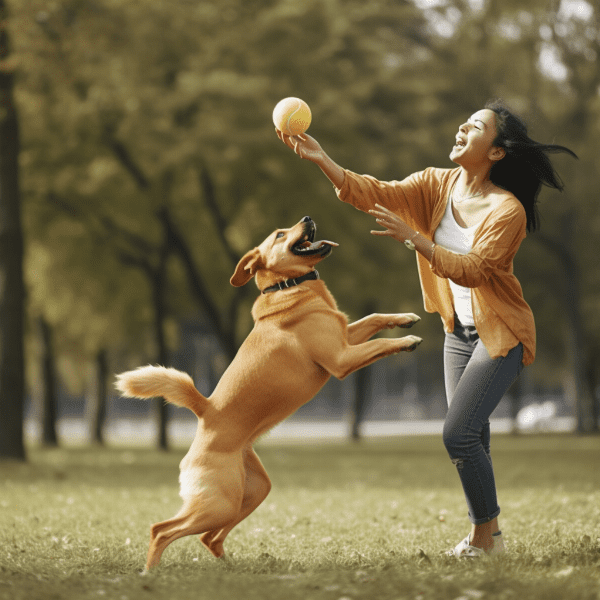
Creating a Designated Digging Area
Choose a Suitable Location
When choosing a location for your dog’s designated digging area, consider an area that is easily accessible for your dog and away from any valuable plants or structures. You may also want to choose an area that is shaded or sheltered to provide your dog with a comfortable place to dig.
Use Soft, Loose Soil
Dogs often prefer to dig in soft, loose soil, so consider using sand or loose dirt in your dog’s designated digging area. This will make it more appealing for your dog to dig in this area rather than other areas of your yard.
Encourage Use with Toys and Treats
To encourage your dog to use their designated digging area, consider burying toys or treats in the area to make it more appealing. You can also praise and reward your dog when they use their designated digging area to reinforce the behavior.
Regular Maintenance
Be sure to regularly maintain your dog’s designated digging area by removing any debris or waste and adding fresh soil or sand as needed. This will help keep the area clean and appealing for your dog to use.
Creating a designated digging area for your dog can be a simple and effective solution to prevent them from digging in unwanted areas of your yard. By providing your dog with a specific area to dig, you can redirect their digging behavior and create a happy and healthy living environment for both you and your dog.
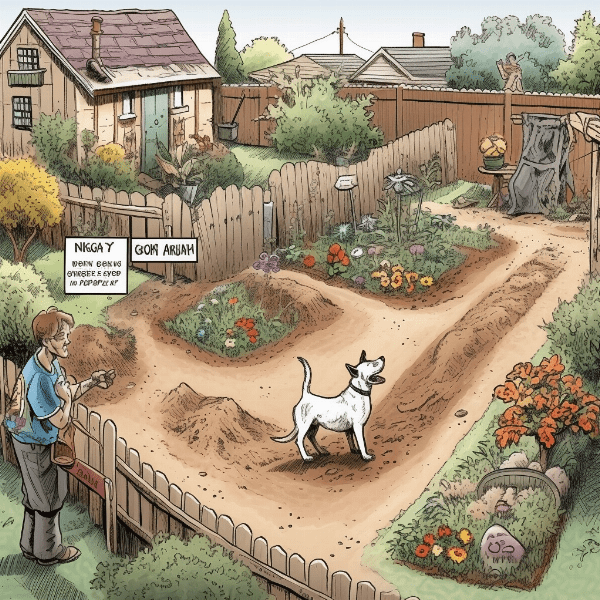
Using Positive Reinforcement Training Techniques
Using positive reinforcement training techniques is another effective way to prevent your dog from digging. By rewarding your dog for good behavior and ignoring bad behavior, you can encourage them to engage in desirable behaviors such as using their designated digging area instead of digging in unwanted areas. Here are some tips for using positive reinforcement training techniques to prevent digging:
Consistency
Consistency is key when it comes to using positive reinforcement training techniques. Be sure to praise and reward your dog every time they engage in desirable behaviors and ignore undesirable behaviors consistently.
Redirecting Behavior
If you catch your Dog digging in an unwanted area, redirect their behavior to their designated digging area and praise them when they start digging there instead. This will help reinforce the behavior of using the designated area for digging.
.
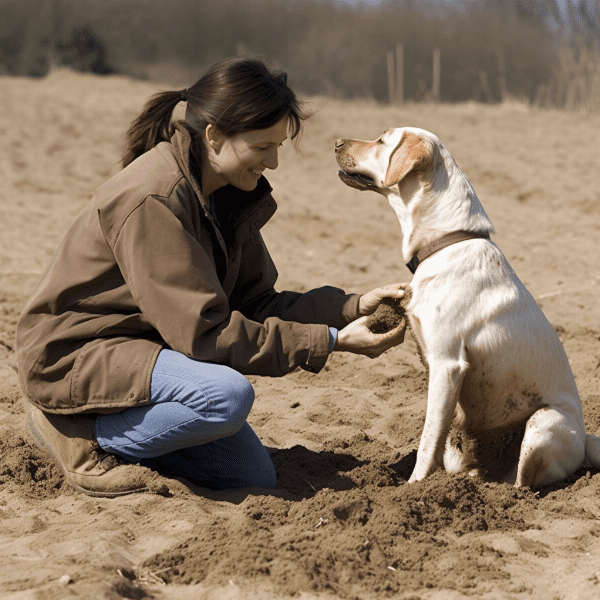
Blocking Off Access to Digging Areas
Fencing
Fencing is a great way to block off access to certain areas of your yard. Consider installing a fence around your garden or other areas of your yard where you don’t want your dog to dig.
Barriers
If fencing isn’t an option, consider using other barriers such as rocks or plants to block off access to certain areas. These barriers can be effective in preventing your dog from digging in unwanted areas.
Repellents
There are a variety of repellents on the market that can be used to discourage your dog from digging in unwanted areas. These can include sprays or granules that emit a scent that dogs find unpleasant.
Supervision
If you’re unable to block off access to certain areas, consider supervising your dog when they’re outside. By keeping a close eye on your dog, you can redirect their behavior if they start digging in unwanted areas.
Digging Prevention Products
There are also a variety of products on the market designed to prevent digging such as underground barriers or mats that emit a harmless static shock when stepped on.
Blocking off access to digging areas can be an effective way to prevent your dog from digging in unwanted areas of your yard. By using fencing, barriers, repellents, supervision, or digging prevention products, you can redirect your dog’s digging behavior and protect your yard at the same time.
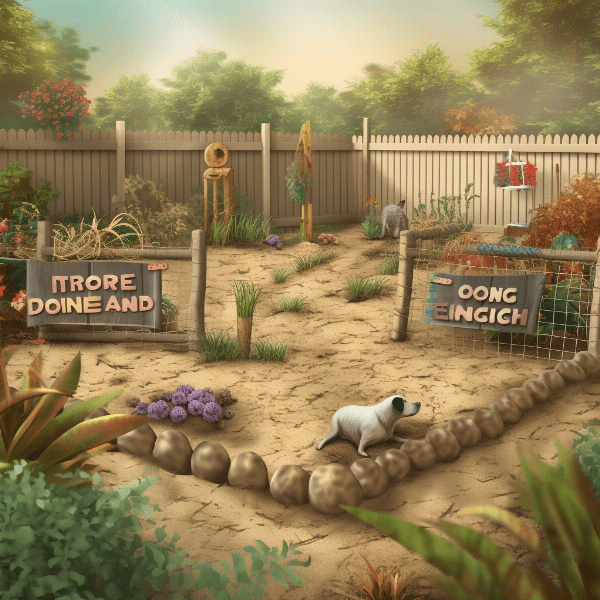
Using Deterrents to Discourage Digging
Using deterrents is another effective way to discourage your dog from digging in unwanted areas of your yard. Deterrents can be either physical or chemical and work by making the area unpleasant or uncomfortable for your dog to dig in. Here are some tips for using deterrents to discourage digging:
Physical Deterrents
Physical deterrents work by making the area physically uncomfortable for your dog to dig in. This can include placing rocks, chicken wire, or other objects in the area that your dog finds unpleasant to dig in.
Chemical Deterrents
Chemical deterrents work by emitting a scent or taste that dogs find unpleasant. There are a variety of sprays and granules on the market that can be used to deter dogs from digging in unwanted areas.
Water Spray
A water spray can be an effective deterrent for dogs that enjoy digging in certain areas. When you see your dog digging in an unwanted area, use a water spray to interrupt the behavior and discourage them from continuing.
Motion-Activated Deterrents
Motion-activated deterrents such as sprinklers or alarms can be effective in discouraging dogs from digging in unwanted areas. These deterrents work by sensing movement and emitting a loud noise or spraying water when triggered.
Consistency
Consistency is key when using deterrents to discourage digging. Be sure to use the deterrent consistently and in the same areas to discourage your dog from digging in unwanted areas.
Using deterrents can be an effective way to discourage your dog from digging in unwanted areas of your yard. By using physical or chemical deterrents, water sprays, motion-activated deterrents, or other methods, you can create a happier and healthier living environment for both you and your dog.
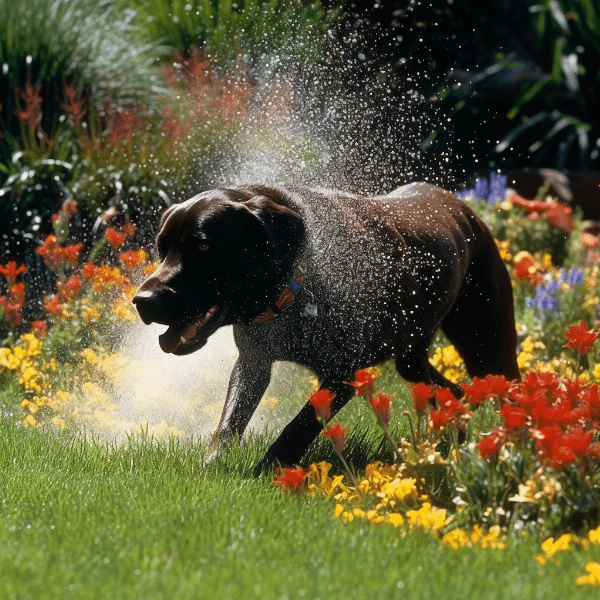
Providing Appropriate Chew Toys
Choose Durable Toys
When choosing chew toys for your dog, be sure to choose durable toys that can withstand heavy chewing. This will prevent your dog from quickly destroying the toy and moving on to other destructive behaviors such as digging.
Variety
Providing a variety of chew toys can help keep your dog interested and engaged. Consider rotating the toys every few days to keep your dog interested and prevent boredom.
Kong Toys
Kong toys are a popular choice for dogs that enjoy chewing. These toys can be filled with treats or peanut butter to provide your dog with mental stimulation and a tasty reward.
Bones and Antlers
Bones and antlers can be another great option for dogs that enjoy chewing. Be sure to choose bones or antlers that are appropriate for your dog’s size and breed.
Avoid Inappropriate Items
Avoid giving your dog inappropriate items such as shoes, socks, or furniture to chew on. This can encourage destructive behaviors such as digging and can also be dangerous for your dog.
Providing appropriate chew toys is a simple and effective way to prevent your dog from digging. By giving your dog an outlet for their natural chewing behavior, you can redirect their energy and create a happier and healthier living environment for both you and your dog.
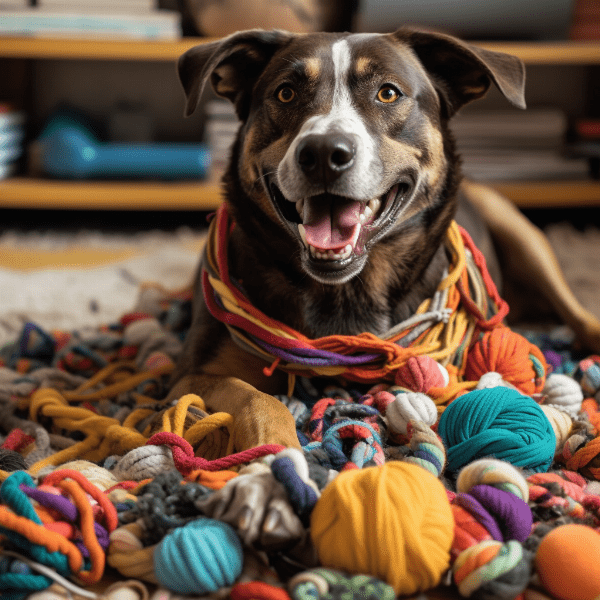
Addressing Separation Anxiety and Boredom
Separation anxiety and boredom can be common causes of digging in dogs. If your dog is digging out of anxiety or boredom, it’s important to address the root cause of the behavior to prevent further digging. Here are some tips for addressing separation anxiety and boredom:
Provide Mental Stimulation
Providing mental stimulation for your dog is a great way to prevent boredom and destructive behaviors such as digging. This can include providing puzzle toys, interactive games, or obedience training.
Crate Training
Crate training can be an effective way to reduce separation anxiety in dogs. When done correctly, a crate can provide your dog with a comfortable and secure space to relax in when you’re away from home.
Comfort Items
Providing comfort items such as a favorite blanket or toy can help reduce separation anxiety and provide comfort for your dog when you’re away from home.
.

Seeking Professional Assistance
If your dog’s digging behavior is causing significant damage or you’re having difficulty managing the behavior on your own, it may be time to seek professional assistance. Here are some tips for seeking professional assistance:
Certified Dog Trainer or Behaviorist
Consider seeking assistance from a certified dog trainer or behaviorist. These professionals have the expertise and knowledge to help address your dog’s digging behavior and provide personalized training plans to prevent further digging.
Veterinary Consultation
If your dog’s digging behavior is sudden or unusual, it may be a sign of an underlying medical issue. Consider scheduling a veterinary consultation to rule out any potential medical issues.
Group Training Classes
Group training classes can be a great way to provide your dog with socialization opportunities and address behavioral issues such as digging in a group setting.
Consistency
Be sure to consistently follow the training plan provided by the professional you seek assistance from. Consistency is key when it comes to addressing behavioral issues in dogs.
Patience
Seeking professional assistance can be a valuable tool in preventing and addressing digging behavior in dogs. By working with a certified dog trainer or behaviorist, scheduling a veterinary consultation, attending group training classes, being consistent, and remaining patient, you can create a happier and healthier living environment for both you and your dog.
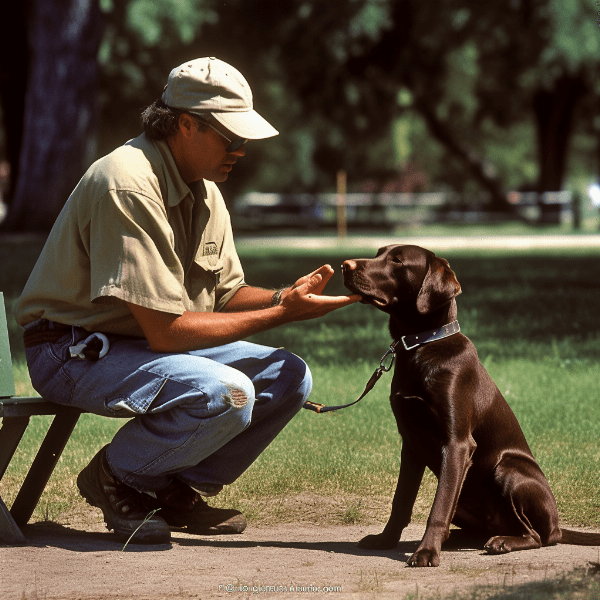
Consistency and Patience: Keys to Success
Consistency and patience are two key elements when it comes to preventing and addressing digging behavior in dogs. By remaining consistent and patient throughout the training process, you can create a happier and healthier living environment for both you and your dog. Here are some tips for maintaining consistency and patience:
Stick to a Routine
Creating a consistent routine for your dog can help maintain consistency in their training. Stick to a regular schedule for feeding, exercise, and playtime to provide structure and stability for your dog.
Reinforce Good Behavior
When your dog displays desirable behaviors such as using their designated digging area or refraining from digging in unwanted areas, be sure to praise and reward them consistently. This will help reinforce good behavior and encourage your dog to continue engaging in desirable behaviors.
Seek Professional Assistance
If you’re having difficulty maintaining consistency or patience, consider seeking professional assistance from a certified dog trainer or behaviorist. They can provide guidance and support to help you stay consistent and patient throughout the training process.
Consistency and patience are crucial when it comes to preventing and addressing digging behavior in dogs. By sticking to a routine, reinforcing good behavior, ignoring bad behavior, remaining patient, and seeking professional assistance if needed, you can create a happy and healthy living environment for both you and your dog.




